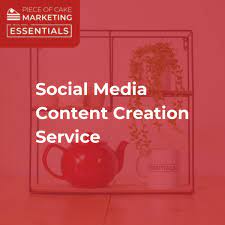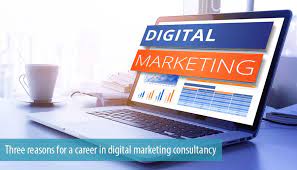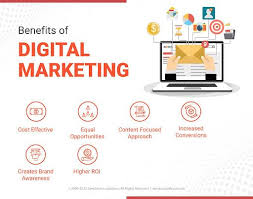Digital Marketing Consultancy: Unlocking the Potential of Online Success
In today’s fast-paced digital landscape, businesses face the challenge of standing out from the crowd and reaching their target audience effectively. This is where a digital marketing consultancy can play a crucial role in helping businesses navigate the complexities of online marketing and achieve remarkable results.
A digital marketing consultancy is a team of experts who specialize in developing and implementing strategic online marketing campaigns. They possess an in-depth understanding of various digital channels, platforms, and tools that can be leveraged to drive brand awareness, increase website traffic, generate leads, and ultimately boost conversions.
One of the key advantages of partnering with a digital marketing consultancy is their ability to provide an objective perspective. Often, businesses get caught up in their own bubble and struggle to see beyond their existing strategies. A consultancy brings fresh insights and innovative ideas to the table, ensuring that your digital marketing efforts remain relevant and effective.
Moreover, a reputable consultancy will take the time to understand your business goals, target audience, and competitive landscape. This allows them to tailor their strategies specifically to your needs. By conducting thorough market research and analysis, they can identify untapped opportunities, develop targeted messaging, and devise comprehensive plans that align with your overall business objectives.
Digital marketing consultancies excel at harnessing the power of data analytics. They utilize advanced tools to track key performance metrics such as website traffic, conversion rates, customer engagement levels, and more. By analyzing this data regularly, they can identify trends and patterns that inform decision-making processes. This data-driven approach ensures that campaigns are continuously optimized for maximum impact.
Another advantage of working with a digital marketing consultancy is access to specialized expertise across various disciplines. From search engine optimization (SEO) to social media management, content creation to pay-per-click (PPC) advertising – these consultants have deep knowledge in each area. They stay up-to-date with industry best practices and emerging trends so you can benefit from the latest strategies and techniques.
Furthermore, a consultancy can help you navigate the ever-changing digital landscape. They are well-versed in the latest algorithm updates, platform changes, and industry regulations. This knowledge ensures that your campaigns remain compliant and effective, saving you time and effort in staying on top of these constant updates.
Ultimately, partnering with a digital marketing consultancy allows businesses to unlock their full online potential. By leveraging their expertise, businesses can expand their reach, engage with their target audience effectively, and achieve tangible results in terms of brand visibility, lead generation, and revenue growth.
If you’re ready to take your digital marketing efforts to the next level and drive meaningful business outcomes, consider collaborating with a trusted digital marketing consultancy. Their strategic guidance, data-driven approach, and specialized expertise will help you navigate the complex world of online marketing with confidence. Embrace the power of digital marketing consultancy today and unlock new opportunities for success in the digital realm.
6 Essential Tips for Choosing a Digital Marketing Consultant in the UK
- Research potential digital marketing consultants thoroughly before making a decision.
- Ask for references from previous clients and read reviews online to assess the quality of work provided by the consultant.
- Ensure that the digital marketing consultant has experience in your industry or sector, and can demonstrate successful results from past projects.
- Make sure you have a clear understanding of the services offered by the consultant, including any costs associated with them, before signing any contracts or agreements.
- Have regular communication with your digital marketing consultant to ensure that all objectives are being met and deadlines are being kept on track.
- Take advantage of any free advice or resources offered by your chosen digital marketing consultancy – this could help you save money in the long run!
Research potential digital marketing consultants thoroughly before making a decision.
Research Potential Digital Marketing Consultants: The Key to Finding the Perfect Partner
When it comes to choosing a digital marketing consultant, thorough research is essential. With countless options available, it’s crucial to invest time and effort into finding the perfect partner who aligns with your business goals and can deliver the results you desire.
The first step in researching potential digital marketing consultants is to assess their expertise and experience. Look for consultants who have a proven track record of success in your industry or niche. Check their portfolio, case studies, and client testimonials to gauge their capabilities and the results they have achieved for others.
Next, delve into their specific areas of expertise. Digital marketing encompasses various disciplines such as SEO, social media management, content marketing, PPC advertising, email marketing, and more. Ensure that the consultant you choose has a strong command of the specific areas that are most relevant to your business objectives.
Consider their approach and methodology. A reputable digital marketing consultant will have a well-defined process for developing strategies, executing campaigns, and measuring results. They should be able to articulate their approach clearly and explain how they will tailor their strategies to meet your unique needs.
Transparency is key when selecting a digital marketing consultant. Look for consultants who are open about their pricing structure, deliverables, timelines, and communication channels. Clear expectations from the beginning will help establish a solid working relationship built on trust.
Take the time to read reviews or seek recommendations from trusted sources. Online reviews can provide valuable insights into previous clients’ experiences with a particular consultant. Additionally, ask colleagues or industry peers if they can recommend any consultants they have worked with in the past.
Communication is vital when collaborating with a digital marketing consultant. Assess how responsive and accessible they are during the initial stages of communication. Prompt replies and effective communication channels are indicators of their commitment to delivering exceptional service.
Lastly, consider scheduling an initial consultation or meeting with shortlisted consultants before making your final decision. This will give you an opportunity to discuss your business goals, ask questions, and gauge their level of understanding and enthusiasm for your project.
Remember, choosing the right digital marketing consultant can significantly impact the success of your online marketing efforts. Thorough research will ensure that you find a partner who not only possesses the necessary expertise but also shares your vision and values.
By investing time in researching potential digital marketing consultants, you can make an informed decision that sets you on the path to achieving your business goals and unlocking the full potential of your online presence.
Ask for references from previous clients and read reviews online to assess the quality of work provided by the consultant.
When it comes to choosing a digital marketing consultancy, one valuable tip is to ask for references from previous clients and read reviews online. This step can provide valuable insights into the quality of work provided by the consultant and help you make an informed decision.
By asking for references, you can directly reach out to past clients and inquire about their experience working with the consultancy. This allows you to gain firsthand knowledge of how the consultant performed, their level of professionalism, and the results they were able to achieve. Speaking with previous clients can provide valuable insights into the consultant’s expertise, communication style, and overall effectiveness in delivering on their promises.
In addition to seeking references, reading reviews online is another effective way to assess the quality of work provided by a digital marketing consultancy. Online reviews often come from unbiased sources who have had direct experience with the consultancy. These reviews can shed light on various aspects such as project management, campaign performance, customer service, and overall satisfaction. Pay attention to both positive and negative reviews to get a well-rounded understanding of the consultant’s strengths and weaknesses.
When assessing references and reading reviews, look for consistency in feedback. If multiple clients highlight similar positive attributes or express concerns about particular aspects of the consultancy’s work, it can provide a clearer picture of what you can expect.
It’s important to note that no consultancy will have a perfect track record or satisfy every client completely. However, by reviewing references and online feedback, you can gauge whether their approach aligns with your business goals and if they have a proven track record of delivering successful outcomes.
Remember that reputation matters in the world of digital marketing consultancy. A strong portfolio of satisfied clients and positive reviews demonstrates credibility and reliability. By taking this tip into consideration during your selection process, you increase your chances of partnering with a reputable consultancy that will deliver exceptional results for your business.
So don’t hesitate to ask for references from previous clients and dive into online reviews when evaluating a digital marketing consultancy. This due diligence will provide you with valuable insights and help you make an informed decision, ensuring that you find the right consultancy partner to drive your digital marketing success.
Ensure that the digital marketing consultant has experience in your industry or sector, and can demonstrate successful results from past projects.
When it comes to choosing a digital marketing consultant, one important tip to keep in mind is to ensure that they have relevant experience in your industry or sector. Why is this so crucial? Well, having a consultant who understands the nuances and dynamics of your specific industry can make a world of difference in the success of your digital marketing campaigns.
A digital marketing consultant with industry experience brings valuable insights and knowledge that can be applied directly to your business. They understand the unique challenges and opportunities that exist within your sector, allowing them to develop tailored strategies that resonate with your target audience.
By working with a consultant who has successfully navigated similar industries before, you can tap into their wealth of expertise and benefit from their proven track record. Look for case studies or testimonials from past clients to see if they have achieved tangible results in your industry. A reputable consultant will be able to provide evidence of their success through metrics such as increased website traffic, higher conversion rates, or improved brand visibility.
Not only does industry experience ensure that the consultant understands the intricacies of your market, but it also means they are likely to have established relationships and networks within your sector. This can be highly advantageous when it comes to collaborations, partnerships, or influencer outreach. Their connections can help amplify your brand’s reach and open doors to new opportunities.
Furthermore, an experienced digital marketing consultant will have a deep understanding of the latest trends and best practices within your industry. They stay up-to-date with changes in consumer behavior, competitor strategies, and emerging technologies specific to your sector. This knowledge allows them to craft innovative campaigns that stand out from the competition and deliver exceptional results.
Remember, choosing a digital marketing consultant solely based on their general expertise may not yield optimal outcomes for your business. By selecting someone with industry-specific experience and proven success in past projects, you increase the likelihood of achieving outstanding results in your digital marketing efforts.
So take the time to research potential consultants, review their portfolios, and ask for references from clients in your industry. By ensuring that the consultant has relevant experience and a track record of success, you can confidently move forward knowing that you have a partner who understands your industry inside out and can deliver the results you desire.
Make sure you have a clear understanding of the services offered by the consultant, including any costs associated with them, before signing any contracts or agreements.
When it comes to partnering with a digital marketing consultancy, one crucial tip stands out: ensure you have a clear understanding of the services offered and associated costs before committing to any contracts or agreements. This step is vital in avoiding any surprises or misunderstandings down the line.
Before signing on the dotted line, take the time to thoroughly review and discuss the services that will be provided by the consultant. Understand their areas of expertise, such as search engine optimization (SEO), social media management, content creation, email marketing, or paid advertising. Clarify whether they offer a comprehensive package or if you can choose specific services that align with your business goals.
Equally important is having transparency regarding costs. Discuss and outline the pricing structure for their services. Some consultants may charge a flat fee for specific projects, while others may work on an hourly basis. It’s essential to understand how and when you will be billed for their expertise and what factors might affect additional charges.
Additionally, inquire about any potential additional expenses that could arise during the course of your collaboration. For instance, there might be costs associated with running paid advertising campaigns or purchasing software tools necessary for implementing certain strategies. By having a clear understanding of these potential expenses upfront, you can budget accordingly and avoid unexpected financial burdens.
Don’t hesitate to ask for clarification if anything seems unclear or ambiguous in the contract or agreement. A reputable digital marketing consultancy will be more than willing to address your concerns and provide further explanations.
By ensuring a clear understanding of services offered and associated costs, you can enter into a partnership with confidence. This level of clarity allows both parties to align expectations, establish mutual trust, and work towards shared goals effectively.
Remember, choosing a digital marketing consultancy is an investment in your business’s online success. Take the time to review contracts thoroughly, ask questions when needed, and make informed decisions. With this tip in mind, you’ll be well-prepared to embark on a fruitful collaboration that drives your business forward in the digital realm.
Have regular communication with your digital marketing consultant to ensure that all objectives are being met and deadlines are being kept on track.
Regular Communication: The Key to Success in Digital Marketing Consultancy
When it comes to working with a digital marketing consultant, one of the most important tips for achieving success is maintaining regular and open communication. By keeping the lines of communication open, you can ensure that all objectives are being met and deadlines are being kept on track.
Digital marketing is a dynamic field that requires constant monitoring and adjustment. Having regular check-ins with your consultant allows you to stay informed about the progress of your campaigns, address any concerns or questions that may arise, and make timely adjustments if needed.
By maintaining regular communication, you can ensure that everyone involved is on the same page. This includes discussing campaign goals, target audience insights, key performance indicators (KPIs), and any changes in business objectives or priorities. By aligning your expectations and sharing updates regularly, you can work together more effectively towards achieving your digital marketing goals.
Regular communication also allows for timely feedback and collaboration. Your consultant may have valuable insights or recommendations based on their expertise and industry knowledge. By sharing information and engaging in discussions, you can collectively make informed decisions that drive better results.
Furthermore, staying in touch with your digital marketing consultant helps keep deadlines on track. With clear communication channels established, both parties can stay accountable for meeting project milestones and deliverables. This ensures that campaigns are executed according to plan and within the agreed-upon timelines.
In addition to scheduled meetings or calls, take advantage of other communication tools available such as email or project management platforms. These tools provide a convenient way to exchange information, share documents or assets, ask questions, and provide updates between formal meetings.
Remember that effective communication is a two-way street. Encourage your digital marketing consultant to share progress reports regularly so you can review campaign performance together. This transparency allows you to evaluate the effectiveness of strategies implemented thus far and make data-driven decisions moving forward.
Lastly, be proactive in seeking clarification or voicing any concerns. If you have questions or uncertainties about the progress or direction of your digital marketing campaigns, don’t hesitate to reach out to your consultant. They are there to support you and address any issues that may arise.
In conclusion, regular communication is vital when working with a digital marketing consultant. By keeping the lines of communication open, you can ensure that all objectives are being met, deadlines are being kept on track, and adjustments can be made promptly if needed. Embrace open dialogue, collaborate effectively, and leverage the expertise of your consultant to maximize the success of your digital marketing efforts.
Take advantage of any free advice or resources offered by your chosen digital marketing consultancy – this could help you save money in the long run!
When it comes to partnering with a digital marketing consultancy, one valuable tip to keep in mind is to take advantage of any free advice or resources they offer. This simple step can actually help you save money in the long run while maximizing the benefits of their expertise.
Many reputable digital marketing consultancies understand the importance of building trust and establishing a strong relationship with their clients. As part of their commitment to customer satisfaction, they often provide free advice, resources, or even educational materials that can help businesses better understand and navigate the world of digital marketing.
By utilizing these free offerings, you gain access to valuable insights and knowledge without incurring any additional costs. Whether it’s blog articles, e-books, webinars, or online tutorials, these resources can equip you with the necessary information to make informed decisions about your digital marketing strategies.
Not only do these resources empower you with knowledge, but they also enable you to have more meaningful discussions with your chosen consultancy. Armed with a basic understanding of key concepts and industry trends, you can engage in more productive conversations and collaborate effectively on developing tailored strategies for your business.
Furthermore, by taking advantage of free advice or consultations offered by your chosen consultancy, you can tap into their expertise without committing to a full-scale engagement right away. This allows you to assess their capabilities firsthand and determine if their approach aligns with your business goals before making any financial commitments.
Additionally, leveraging these free resources can help you identify potential areas for improvement within your existing digital marketing efforts. By gaining insights from industry experts who have worked with numerous clients across various sectors, you may uncover opportunities that were previously overlooked or discover new tactics that could enhance your overall strategy.
Ultimately, by making use of the free advice and resources offered by your selected digital marketing consultancy, you are investing in knowledge that can positively impact your business’s bottom line. You gain access to expert guidance without incurring additional expenses while positioning yourself for long-term success in the digital realm.
So, don’t hesitate to explore the free offerings provided by your chosen digital marketing consultancy. Take advantage of their generosity and expertise, as it can help you save money in the long run while maximizing the value of your partnership. Embrace these resources as valuable tools on your journey towards digital marketing success.












